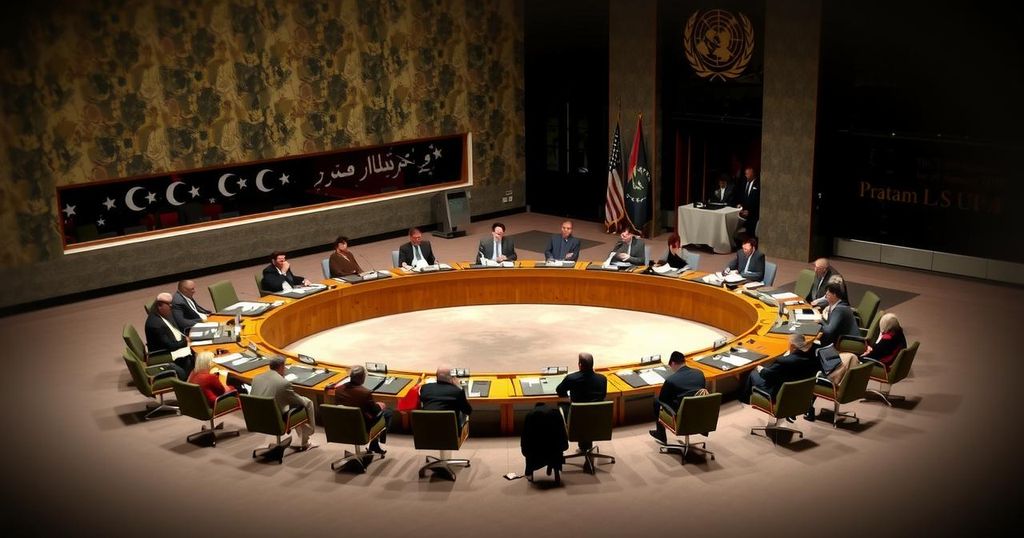Pakistan’s UN Security Council Membership: Challenges and Implications

Pakistan has commenced its two-year term as a temporary member of the UN Security Council on January 1, 2025. Despite pledging constructive solutions to global issues, concerns linger about its history of using terrorism as state policy. With heightened scrutiny from India, observers aim to determine whether Pakistan will genuinely fight terrorism or pursue its geopolitical agendas during its UNSC tenure.
On January 1, 2025, Pakistan began its two-year term as a temporary member of the United Nations Security Council (UNSC), marking the country’s eighth tenure in this prestigious role. While Pakistani officials portray this opportunity as a platform to contribute to the resolution of global issues, apprehensions arise from neighboring India regarding Pakistan’s history of utilizing terrorism as an instrument of state policy, which raises concerns about its potential use of this newly acquired status to further its own agenda.
Pakistani diplomat Munir Akram emphasized Pakistan’s commitment to providing “active and constructive solutions” to global challenges, including the fight against terrorism. Although this pledge is commendable in theory, it appears somewhat disingenuous when juxtaposed against Pakistan’s longstanding record of harboring and supporting terrorist organizations, particularly those that target India and Afghanistan. This inconsistency casts a shadow over Pakistan’s intentions to genuinely combat terrorism on a global scale.
The UNSC is a vital organ of the United Nations, responsible for maintaining international peace and security. Composed of 15 members, with five permanent members wielding veto power, Pakistan’s non-permanent term will provide it the opportunity to influence various international debates and resolutions. Despite lacking veto authority, Pakistan’s engagement in key discussions could have significant implications depending on the alliances it fosters during its term.
India, which has a historically contentious relationship with Pakistan, poses grave concerns regarding Pakistan’s potential maneuvers within the UNSC. Observers are particularly wary that Pakistan may leverage its position to promote its long-held agenda concerning Kashmir, an issue it has consistently raised in international forums. Moreover, Pakistan’s UNSC membership may enable it to access influential committees that impose sanctions on entities linked to terrorism, amplifying fears that it may obstruct actions targeting groups operating within its influence as it seeks to reinforce its geopolitical position.
For Pakistan, occupying a role within the UNSC enhances its opportunity to advocate for international peace. However, its historical affiliations with terrorism raise skepticism about its reliability in fulfilling this ambition. The international community, particularly India, must carefully scrutinize Pakistan’s activities within this framework, assessing whether its actions will align with its stated commitments to combat terrorism or if it will pursue regional destabilization.
In summary, while Pakistan’s professed aim to combat terrorism from the UNSC seems favorable, it must be contextualized against its history of supporting cross-border terrorism. As Pakistan embarks on this two-year term, it is imperative for the global community to maintain vigilance, monitoring whether its actions will indeed reflect its rhetoric, or if it will exploit its new position to advance its geopolitical objectives at the possible expense of broader regional and global stability.
Pakistan’s recent assumption of a temporary seat on the United Nations Security Council (UNSC) on January 1, 2025, serves as a significant event in international diplomacy. This membership, which allows Pakistan to participate in global discussions regarding peace and security over the following two years, raises essential questions about the implications of its longstanding use of terrorism as a state policy. Given its contentious history with neighboring India, particularly regarding cross-border terrorism and the Kashmir conflict, the context surrounding this membership is critical to understanding Pakistan’s potential influence during its term in the UNSC.
The duality of Pakistan’s situation in the UNSC reflects both an opportunity to contribute positively to global security and the residual doubt stemming from its past behavior related to terrorism. As the country undertakes its responsibilities as a temporary member, the international community must remain vigilant in observing its actions and determining whether they align with its overt intentions to combat global terrorism, or if ulterior motives will drive its conduct on this influential platform.
Original Source: www.financialexpress.com








